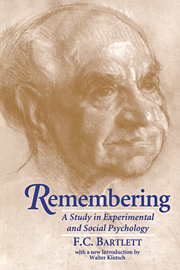Book contents
- Frontmatter
- Contents
- Biography of Sir Frederic C. Bartlett
- Introduction by Walter Kintsch
- Preface
- PART I EXPERIMENTAL STUDIES
- Chapter I Experiment in Psychology
- Chapter II Experiments on Perceiving
- Chapter III Experiments on Imaging
- Chapter IV Experiments on Remembering: (a) The Method of Description
- Chapter V Experiments on Remembering: (b) The Method of Repeated Reproduction
- Chapter VI Experiments on Remembering: (c) The Method of Picture Writing
- Chapter VII Experiments on Remembering: (d) The Method of Serial Reproduction; I
- Chapter VIII Experiments on Remembering: (e) The Method of Serial Reproduction; II. Picture Material
- Chapter IX Perceiving, Recognising, Remembering
- Chapter X A Theory of Remembering
- Chapter XI Images and their Functions
- Chapter XII Meaning
- PART II REMEMBERING AS A STUDY IN SOCIAL PSYCHOLOGY
- Index
- Plate section
Chapter II - Experiments on Perceiving
Published online by Cambridge University Press: 04 August 2010
- Frontmatter
- Contents
- Biography of Sir Frederic C. Bartlett
- Introduction by Walter Kintsch
- Preface
- PART I EXPERIMENTAL STUDIES
- Chapter I Experiment in Psychology
- Chapter II Experiments on Perceiving
- Chapter III Experiments on Imaging
- Chapter IV Experiments on Remembering: (a) The Method of Description
- Chapter V Experiments on Remembering: (b) The Method of Repeated Reproduction
- Chapter VI Experiments on Remembering: (c) The Method of Picture Writing
- Chapter VII Experiments on Remembering: (d) The Method of Serial Reproduction; I
- Chapter VIII Experiments on Remembering: (e) The Method of Serial Reproduction; II. Picture Material
- Chapter IX Perceiving, Recognising, Remembering
- Chapter X A Theory of Remembering
- Chapter XI Images and their Functions
- Chapter XII Meaning
- PART II REMEMBERING AS A STUDY IN SOCIAL PSYCHOLOGY
- Index
- Plate section
Summary
INTRODUCTORY
The main problems of the first part of this book all concern ways in which remembering is actually effected at the human level of experience and behaviour. Many of these problems are readily suggested by general observation, but if they are to be solved with any degree of definiteness some of them must be selected and submitted to more intensive methods of study.
All people who have at any time been concerned with the nature and validity of everyday observation must have noticed that a great amount of what goes under the name of perception is, in the wide sense of the term, recall. Some scene is presented for observation, and a little of it is actually perceived. But the observer reports much more than this. He fills up the gaps of his perception by the aid of what he has experienced before in similar situations, or, though this comes to much the same thing in the end, by describing what he takes to be ‘fit’, or suitable, to such a situation. He may do this without being in the least aware that he is either supplementing or falsifying the data of perception. Yet, in almost all cases, he is certainly doing the first, and in many instances he is demonstrably doing the second.
It is often urged that this unwitting supplementation of immediate perceptual data must be sharply distinguished from memory. We should say that a man is remembering, only when he is definitely oriented towards his past life, and is aware that he is trying to drag out of this some facts which were once present to sensory perception, but are so no longer.
- Type
- Chapter
- Information
- RememberingA Study in Experimental and Social Psychology, pp. 14 - 33Publisher: Cambridge University PressPrint publication year: 1995



